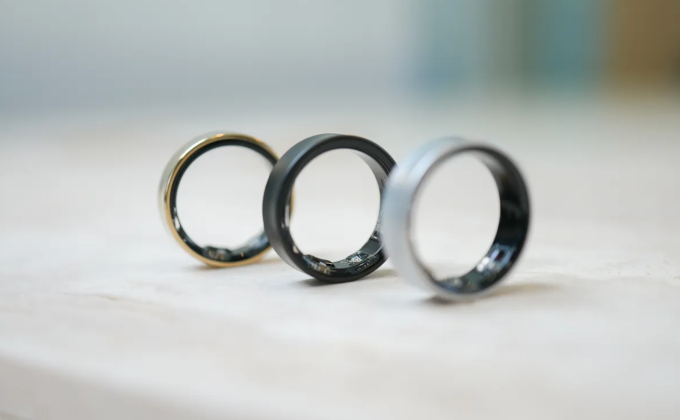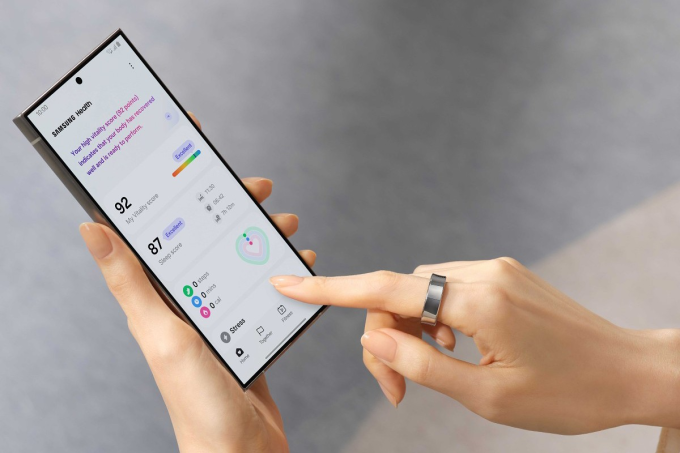Samsung's Galaxy Ring is considered to have complete hardware but limited features, and needs to expand the ecosystem to become a pioneering product.

At the Galaxy Unpacked 2024 event on July 10 in Paris, Samsung announced the Galaxy Z Fold6, Z Flip6 and a series of wearable devices. Of which, the Galaxy Ring became the center of attention, marking Samsung as the first phone company to enter the smart ring market.
Design
According toThe Verge, Galaxy Ring is quite beautiful, although the overall look is not much different from other smart rings on the market. The product has a titanium frame, is thin and light, and feels better to wear than the Oura Ring. The titanium material is scratch-resistant to level 5, can withstand the impact of exercise such as lifting weights, holding a racket, and is also IP68 waterproof.
Reporter Lexy SavvidesCNet“I found the Galaxy Ring so comfortable to wear that I completely forgot I was wearing it and almost took it off after filming,” said Mr.
Samsung also paid attention to the little details on the Galaxy Ring, like the company recommends wearing it on the index finger for more precise gesture control. Before purchasing, users are provided with a free ring size measuring kit, and can also return it within 30 days if they buy the wrong size.
The carrying case is also a big plus compared to the competition. According toTechRadar, the charging case has a transparent design, "creating a more futuristic feel" than the Oura Ring or Ultrahuman Ring Air, which only have a base form, making the device vulnerable to impact.
Features
Similar to other products on the market, Galaxy Ring is equipped with health monitoring sensors such as heart rate, sleep, blood oxygen levels (SpO2) and some physical activities. All activities are controlled via Galaxy AI and displayed on the Galaxy Health application.
Galaxy AI identifies and provides detailed, personalized health information to users. For example, sleep data such as sleep duration, respiration rate, and heart rate variability are recorded, analyzed, and graded every morning, and suggestions for improvement are made. The same goes for fitness, including high and low heart rate alerts, live heart rate data, automatic workout detection, and inactivity alerts.
According toThe Verge, these features are not too different from what Oura Ring and other competitors are doing. In fact, Samsung's ring does not have sleep apnea detection or the ability to notify about irregular heartbeats. Therefore, this site believes that the appeal of the ring will lie in the Galaxy AI. If this tool is limited and there are no outstanding upgrades in the future, the product will have a hard time standing out to compete with competitors.
In fact, Galaxy AI plays a key role in the Galaxy Ring. This artificial intelligence feature helps users better understand how their health impacts their daily lives, providing personalized recommendations based on their current physical state, helping them make decisions to improve their daily lives.
Meanwhile,PhoneArenathink that the Galaxy Ring is not much different from a smart bracelet, even poor features due to fewer sensors. Not only that, the device has no tracking screen, no vibration and no LED light for warning, making users almost completely dependent on the phone while wearing the ring.
"The only advantage is privacy. That's all," commented this technology site.
CNetFor some, the Galaxy Ring’s attention-grabbing features may not be health-related, such as pinching to take a photo or stop an alarm — something found on the Apple Watch, as well as Samsung’s Galaxy Watch with Universal Gestures. The device can also find lost items, similar to SmartTag or AirTag. However, a long-awaited feature, NFC, which allows users to make payments, unlock cars or smart doors, is absent.

According toZDnet, although it has few features when operating independently, the Galaxy Ring has the potential to complete the Galaxy ecosystem when combined with other devices, opening up a range of utilities for users. For example, users can track sleep or exercise without a bulky device, then view parameters or receive alerts on their smartphone or send them to the TV screen via a smart home. "The biggest advantage of the Galaxy Ring is the Samsung ecosystem," the site commented.
Compatibility and price
Samsung says the Galaxy Ring is best compatible with its own phones. This is considered a limitation, as iPhone users cannot use it, while Android devices from other manufacturers need to install the Samsung Health app and are also limited in features.
The Galaxy Ring is priced at $399, $300 more expensive than the Oura Ring Gen 3. However, Oura users will need to pay an additional $6 per month, or $72 per year, to take full advantage of its features.
"The success of the Galaxy Ring will depend on two things: accurate tracking and good battery life. Samsung needs to do that,"The Vergecomment. "If the device is combined with specific ideas within the Galaxy ecosystem, the Galaxy Ring could very well be a leader in the smart ring space. Otherwise, Samsung is simply stating an ambitious idea."
TH (according to VnExpress)